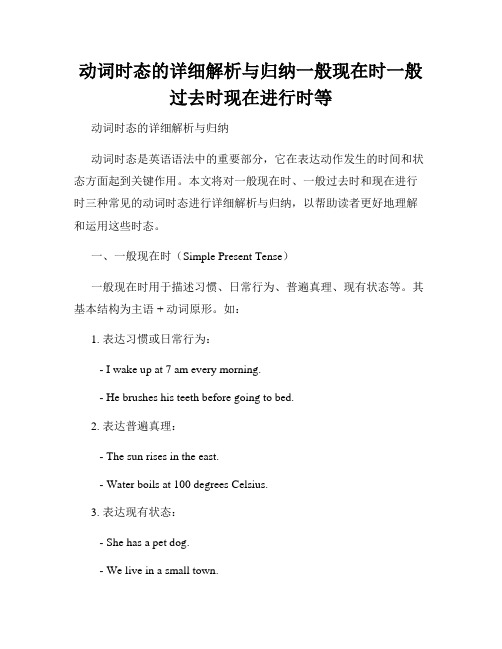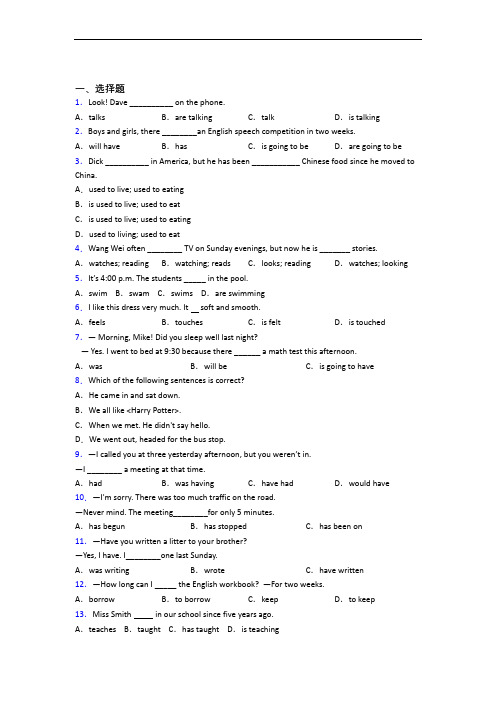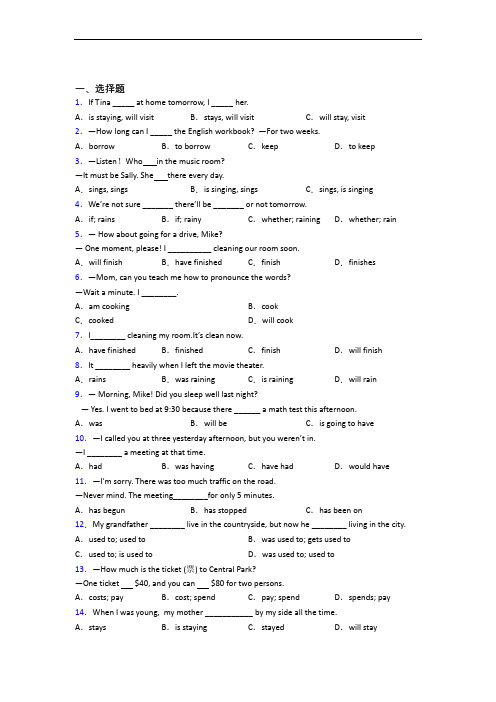初中英语语法知识—动词时态的分类汇编及解析
语法基础动词时态详解

语法基础动词时态详解动词时态是语法中的重要概念,它用来表达动作的时间。
掌握动词时态对于学习和理解英语语法至关重要。
本文将详细介绍动词时态的基础知识,帮助您更好地理解和运用。
一、动词时态简介动词的时态主要分为过去时、现在时和将来时。
它们分别用于表达过去、现在和将来的动作或状态。
在时态中,动词的形式会发生变化,以匹配主语的人称和数。
1. 过去时过去时用于表示过去发生的动作或状态。
一般情况下,过去时的动词形式是动词的过去式。
例如:- I played basketball yesterday.(昨天我打篮球。
)- He watched a movie last night.(昨晚他看了一部电影。
)过去时可再细分为简单过去时、过去进行时、过去完成时和过去完成进行时,它们分别用于不同的语境和句子结构。
2. 现在时现在时用于表示现在正在进行的动作或状态。
一般情况下,现在时的动词形式是动词的原形加上第三人称单数形式的“-s”。
例如:- I study English every day.(我每天学英语。
)- She plays tennis on weekends.(她周末打网球。
)现在时也可再细分为简单现在时、现在进行时、现在完成时和现在完成进行时,它们用于不同的语境和句子结构。
3. 将来时将来时用于表示将来要发生的动作或状态。
一般情况下,将来时的动词形式是辅助动词“will”加上动词原形。
例如:- They will visit their grandparents next week.(他们下周会去看望他们的祖父母。
)- I will finish my homework before dinner.(我会在晚饭前完成作业。
)将来时也可再细分为一般将来时、将来进行时、将来完成时和将来完成进行时。
二、动词时态的使用规则1. 过去时的使用规则过去时主要用于以下几种情况:- 过去发生的动作或事件:- I went to the park yesterday.(我昨天去了公园。
动词时态的详细解析与归纳一般现在时一般过去时现在进行时等

动词时态的详细解析与归纳一般现在时一般过去时现在进行时等动词时态的详细解析与归纳动词时态是英语语法中的重要部分,它在表达动作发生的时间和状态方面起到关键作用。
本文将对一般现在时、一般过去时和现在进行时三种常见的动词时态进行详细解析与归纳,以帮助读者更好地理解和运用这些时态。
一、一般现在时(Simple Present Tense)一般现在时用于描述习惯、日常行为、普遍真理、现有状态等。
其基本结构为主语 + 动词原形。
如:1. 表达习惯或日常行为:- I wake up at 7 am every morning.- He brushes his teeth before going to bed.2. 表达普遍真理:- The sun rises in the east.- Water boils at 100 degrees Celsius.3. 表达现有状态:- She has a pet dog.- We live in a small town.二、一般过去时(Simple Past Tense)一般过去时用于表示过去某个时间发生的动作或状态。
其基本结构为主语 + 动词过去式。
如:1. 表达过去发生的动作:- They visited their grandparents last weekend.- She finished her homework yesterday.2. 表达过去持续的状态:- He lived in Paris for five years.- We were classmates in high school.3. 表达过去的经历或事件:- I went to Japan in 2010.- They saw a movie together last night.三、现在进行时(Present Continuous Tense)现在进行时用于描述正在进行的动作或暂时的状态。
初中的归纳与解析常见的动词时态及其用法解析

初中的归纳与解析常见的动词时态及其用法解析动词时态是我们学习英语时必须掌握的重要内容之一。
掌握动词的不同时态以及其正确用法,对我们准确表达意思、流利交流至关重要。
本文将对初中阶段常见的动词时态进行归纳与解析,帮助同学们更好地理解和运用这些时态形式。
一、一般现在时一般现在时表示经常发生的动作、客观事实、以及习惯性的行为。
其结构为主语+动词原形(单三形式加s/es)。
例如:1. I play basketball every Sunday.(我每个星期天打篮球。
)2. She always eats breakfast at 7 o'clock.(她总是七点钟吃早餐。
)3. The sun rises in the east.(太阳从东方升起。
)二、一般过去时一般过去时表示过去某个时间发生的动作或存在的状态。
其结构为主语+动词的过去式。
例如:1. We visited the museum yesterday.(我们昨天参观了博物馆。
)2. He lived in Paris for five years.(他在巴黎住了五年。
)3. They played football after school.(他们放学后踢足球。
)三、一般将来时一般将来时表示将来某个时间会要发生的动作或存在的状态。
其结构为主语+will/shall+动词原形。
例如:1. I will go to the cinema with my friends tomorrow.(明天我将和朋友们去电影院。
)2. They shall finish their homework before dinner.(他们要在晚饭前完成作业。
)3. We will have a meeting next Monday.(下周一我们将开会。
)四、现在进行时现在进行时表示现在正在进行的动作。
其结构为主语+am/is/are+动词-ing形式。
初中英语知识归纳总结——动词的时态

初中英语知识归纳总结——动词的时态动词的时态(一)教学重点一般现在时在英语中,不同时间里以不同方式发生的动作或存在的状态,要用不同的动词形式来表示,动词的这种不同形式称为动词的时态。
时态从时间上划分,可分为四大类:现在时;过去时;将来时;过去将来时。
从行为上,每一类可以分为四种形式:一般式;进行式;完成式;完成进行式。
这样英语的动词合起来,总共有十六种时态,初中只需掌握其中的八种时态。
1、一般现在时(1)一般现在时表示现在的状态、习惯性的动作或主语所具备的性格和能力等。
①当动词是be时,第一人称用am,第二人称用is,其他人称用are.②当动词是实义动词时,一般用动词原形,但如果主语是第三人称单数时,动词必须用第三人称单数形式,其变化规则如下:助动词do(第三人称单数用does)构成否定句、疑问句及答语,但要注意助动词后原来的谓语动词要恢复原形。
例如:I like music.I don’t like music.Do you like music?Yes, I do No, I don’t(2)一般现在时的用法①表示经常、习惯性动作,常和often, usually, every day, sometimes, always 等时间状语连用。
如:He goes to school by bus every day.They often play football②表示能力、职业、特征。
如:Miss Gao teaches English.Do you speak Japanese?③表示客观存在。
如:The earth moves round the sun.Time and tide wait for no man.④表示已经安排好或计划好的事。
如The plane takes off at 7:30.Classes begin at 8:00⑤在时间状语和条件状语从句中,主句用一般将来时,从句用一般现在时。
初中英语语法知识—动词时态的真题汇编及解析(1)

一、选择题1.Look! Dave __________ on the phone.A.talks B.are talking C.talk D.is talking 2.Boys and girls, there ________an English speech competition in two weeks.A.will have B.has C.is going to be D.are going to be 3.Dick __________ in America, but he has been ___________ Chinese food since he moved to China.A.used to live; used to eatingB.is used to live; used to eatC.is used to live; used to eatingD.used to living; used to eat4.Wang Wei often ________ TV on Sunday evenings, but now he is _______ stories. A.watches; reading B.watching; reads C.looks; reading D.watches; looking 5.It’s 4:00 p.m. The students _____ in the pool.A.swim B.swam C.swims D.are swimming6.I like this dress very much. It soft and smooth.A.feels B.touches C.is felt D.is touched 7.— Morning, Mike! Did you sleep well last night?— Yes. I went to bed at 9:30 because there ______ a math test this afternoon.A.was B.will be C.is going to have 8.Which of the following sentences is correct?A.He came in and sat down.B.We all like <Harry Potter>.C.When we met. He didn't say hello.D.We went out, headed for the bus stop.9.—I called you at three yesterday afternoon, but you weren’t in.—I ________ a meeting at that time.A.had B.was having C.have had D.would have 10.—I'm sorry. There was too much traffic on the road.—Never mind. The meeting________for only 5 minutes.A.has begun B.has stopped C.has been on 11.—Have you written a litter to your brother?—Yes, I have. I________one last Sunday.A.was writing B.wrote C.have written 12.—How long can I _____ the English workbook? —For two weeks.A.borrow B.to borrow C.keep D.to keep 13.Miss Smith in our school since five years ago.A.teaches B.taught C.has taught D.is teaching14.When I was young, my mother ___________ by my side all the time.A.stays B.is staying C.stayed D.will stay 15.—Remember the first time we met, Jim?—Of course I do. You ________ in the library.A.were reading B.have read C.will read D.read 16.Look at Amy. She ________ for the school bus.A.wait B.is waiting C.waits D.waiting 17.The water ______ cool when I jumped into the pool for morning exercise.A.was felt B.is felt C.felt D.feels 18.While I_______ a detective story, someone_______ at the door.A.read, was knockingB.read, knockedC.was reading, knockedD.was reading, was knocking19.---Where have you been recently?---I _______ in Hangzhou on business for a week last month.A.have been B.had gone C.had been D.was 20.It’s 8 o’clock. The students _________ an English class.A.have B.having C.is having D.are having 21.With a book in his hand, the boy ________ in bed.A.lie B.lied C.lay D.lying 22.Don’t talk! The baby ________.A.sleeps B.is sleep C.sleeping D.is sleeping 23.— What do you use MP3 for?— I ________ it ________ to music.A.use; listen B.are listening; listeningC.use; to listen D.is listening; to listening24.My father is a teacher and he ___________ in this school for about twenty years. A.works B.is working C.was working D.has worked 25.—How much is the ticket (票) to Central Park?—One ticket $40, and you can $80 for two persons.A.costs; pay B.cost; spend C.pay; spend D.spends; pay 【参考答案】***试卷处理标记,请不要删除一、选择题1.D【解析】【分析】【详解】句意:看!Dave正在打电话。
初中英语语法知识—动词时态的分类汇编含解析

一、选择题1.If Tina _____ at home tomorrow, I _____ her.A.is staying, will visit B.stays, will visit C.will stay, visit 2.—How long can I _____ the English workbook? —For two weeks.A.borrow B.to borrow C.keep D.to keep 3.—Listen!Who in the music room?—It must be Sally. She there every day.A.sings, sings B.is singing, sings C.sings, is singing 4.We’re not sure _______ there’ll be _______ or not tomorrow.A.if; rains B.if; rainy C.whether; raining D.whether; rain 5.— How about going for a drive, Mike?— One moment, please! I __________ cleaning our room soon.A.will finish B.have finished C.finish D.finishes 6.—Mom, can you teach me how to pronounce the words?—Wait a minute. I ________.A.am cooking B.cookC.cooked D.will cook7.I________ clean ing my room.It’s clean now.A.have finished B.finished C.finish D.will finish8.It ________ heavily when I left the movie theater.A.rains B.was raining C.is raining D.will rain 9.— Morning, Mike! Did you sleep well last night?— Yes. I went to bed at 9:30 because there ______ a math test this afternoon.A.was B.will be C.is going to have 10.—I called you at three yesterday afternoon, but you weren’t in.—I ________ a meeting at that time.A.had B.was having C.have had D.would have 11.—I'm sorry. There was too much traffic on the road.—Never mind. The meeting________for only 5 minutes.A.has begun B.has stopped C.has been on12.My grandfather ________ live in the countryside, but now he ________ living in the city. A.used to; used to B.was used to; gets used toC.used to; is used to D.was used to; used to13.—How much is the ticket (票) to Central Park?—One ticket $40, and you can $80 for two persons.A.costs; pay B.cost; spend C.pay; spend D.spends; pay 14.When I was young, my mother ___________ by my side all the time.A.stays B.is staying C.stayed D.will stay15.He to the zoo yesterday.A.goes B.go C.goed D.went16.It’s 8 o’clock. The students _________ an English class.A.have B.having C.is having D.are having 17.It’s not your turn ye t. Please wait on the chair until you________.A.have called B.will call C.are calling D.are called 18.—How did the accident happen?—You know, it was difficult to see the road clearly because it________.A.was raining B.has rained C.is raining D.will rain 19.Sandy likes ________ TV. She ________ TV every day.A.watching; watching B.watch; watchesC.to watch; is watching D.watching; watches20.Could you please turn down your music? I________.A.work B.works C.am working D.worked 21.— What do you use MP3 for?— I ________ it ________ to music.A.use; listen B.are listening; listeningC.use; to listen D.is listening; to listening22.It often __________ in the north of China in winter, and the weather is very cold. A.snowing B.snows C.snowy23.The restaurant ________ many complaints because of the terrible service since last month. A.receives B.is receiving C.has received D.will receive 24.Look! All my classmates ___________ on the playground.A.are running B.ran C.were running D.run25.Alice always________her notebooks. She is not tidy.A.lose B.lost C.loses D.found【参考答案】***试卷处理标记,请不要删除一、选择题1.B解析:B【解析】【分析】【详解】句意:如果蒂娜明天呆在家里,我就去看她。
(完整版)初中英语语法时态讲解与归纳
(完整版)初中英语语法时态讲解与归纳初中英语语法时态讲解与归纳一、时态的分类英语中的时态包括一般现在时、一般过去时、一般将来时、现在进行时、过去进行时、将来进行时、现在完成时、过去完成时和将来完成时等。
下面将分别进行介绍和归纳。
二、一般现在时一般现在时用于表示经常性的动作、惯、真理等。
其基本结构为:主语 + 动词原形。
例句:- I play football every Sunday.(我每个星期天踢足球。
)- He doesn't like coffee.(他不喜欢咖啡。
)- Does she speak English?(她会说英语吗?)三、一般过去时一般过去时用于表示过去发生的动作或状态。
其基本结构为:主语 + 动词过去式。
例句:- I went to the park yesterday.(我昨天去了公园。
)- They played basketball last night.(他们昨晚打篮球。
)- Did you finish your homework?(你完成作业了吗?)四、一般将来时一般将来时用于表示将来发生的动作或状态。
其基本结构为:主语 + will + 动词原形。
例句:- I will call you later.(我稍后会给你打电话。
)- She will visit her grandparents next week.(她下周会去看望她的祖父母。
)五、现在进行时现在进行时用于表示现在进行的动作。
其基本结构为:主语 + am/is/are + 动词-ing 形式。
例句:- He is studying in the library now.(他现在正在图书馆研究。
)- They are playing soccer in the park.(他们正在公园里踢足球。
)- Is she watching TV at the moment?(她现在正在看电视吗?)六、过去进行时过去进行时用于表示过去某个时间点正在进行的动作。
动词时态的种类及用法总结
动词时态的种类及用法总结动词时态是用来表示动作或状态发生的时间,表达出了一定的时间关系。
在英语中,动词时态分为简单时态、进行时态、完成时态和将来时态。
本文将分别介绍这四种时态的用法。
一、简单时态(Simple Tense)简单时态分为三个时态,分别是一般现在时、一般过去时和一般将来时。
1. 一般现在时(Simple Present Tense)一般现在时用来表示经常性的、习惯性的或普遍性的动作或状态。
示例:- I go to school every day.- She likes to play basketball.- Birds can fly in the sky.2. 一般过去时(Simple Past Tense)一般过去时用来表示过去某个具体时间发生的动作或状态。
示例:- He watched a movie yesterday.- We lived in that house for two years.- They visited their grandparents last weekend.3. 一般将来时(Simple Future Tense)一般将来时用来表示将来某个时间或将来会发生的动作或状态。
示例:- I will finish my homework tomorrow.- She is going to buy a new car next month.- They are leaving for vacation next week.二、进行时态(Progressive Tense)进行时态用于表示正在进行的动作或状态,并强调持续性和进行性。
1. 现在进行时(Present Continuous Tense)现在进行时表示现在正在进行的动作或状态。
示例:- He is talking on the phone right now.- They are studying for the exam at the library.- We are watching a movie tonight.2. 过去进行时(Past Continuous Tense)过去进行时表示过去某一时刻正在进行的动作或状态。
初一知识点解析动词时态综述
初一知识点解析动词时态综述动词时态是英语语法中的重要内容,它用于表示动作或状态发生的时间。
初一学生在学习英语时,需要掌握并理解各种时态的用法。
本文将对初一英语知识点中的动词时态进行综述和解析,帮助初一学生更好地掌握这一语法知识。
一、一般现在时 (Simple Present Tense)一般现在时用于描述经常性或习惯性的动作,以及客观事实和真理。
其构成形式为:主语 + 动词原形。
例如:1. I play basketball every weekend.2. The sun rises in the east.二、一般过去时 (Simple Past Tense)一般过去时用于描述过去某个时间发生的动作或存在的状态。
其构成形式为:主语 + 动词过去式。
例如:1. She watched a movie last night.2. We lived in London for five years.三、一般将来时 (Simple Future Tense)一般将来时用于表示将来某个时间将要发生的动作或存在的状态。
其构成形式为:主语 + will + 动词原形。
例如:1. They will visit their grandparents next week.2. I will study hard for the exam.四、现在进行时 (Present Continuous Tense)现在进行时用于描述现在正在进行的动作或状态。
其构成形式为:主语 + am/is/are + 动词-ing 形式。
例如:1. They are playing football in the park.2. She is reading a book.五、过去进行时 (Past Continuous Tense)过去进行时用于描述过去某个时间正在进行的动作或状态。
其构成形式为:主语 + was/were + 动词-ing 形式。
初一常用动词时态总结及例句分析
初一常用动词时态总结及例句分析动词时态是英语语法中的一个重要概念,它表示动作或状态发生的时间。
在初一阶段,学生们需要学习常用的动词时态,并掌握其正确的使用方法。
本文将对初一常用动词时态进行总结,并提供相应的例句进行分析。
一、一般现在时(Simple Present Tense)一般现在时表示经常性的动作、事实、习惯或普遍真理。
1. 动词规则变化:主语 + 动词原形(第三人称单数加s)例句:- I always go to school by bus.(我总是乘公共汽车去学校。
)- She eats breakfast every morning.(她每天早上吃早餐。
)- Dogs bark.(狗会叫。
)2. 特殊用法:- 表示现在的状态:I am a student.(我是个学生。
)- 表示经常性的真理:The sun rises in the east.(太阳从东方升起。
)二、一般过去时(Simple Past Tense)一般过去时表示过去某个时间发生的动作或状态。
1. 动词规则变化:主语 + 动词过去式例句:- I watched a movie last night.(昨晚我看了一部电影。
)- He played football with his friends yesterday.(昨天他和他的朋友们踢足球。
)- They visited their grandparents last summer.(他们去年夏天拜访了他们的祖父母。
)2. 特殊用法:- 表示过去的习惯:He always ate breakfast at 7 o'clock when he was young.(他年轻时总是在7点吃早饭。
)- 表示过去的真理:Newton discovered the law of gravity.(牛顿发现了万有引力定律。
)三、一般将来时(Simple Future Tense)一般将来时表示将来某个时间会发生的动作或状态。
- 1、下载文档前请自行甄别文档内容的完整性,平台不提供额外的编辑、内容补充、找答案等附加服务。
- 2、"仅部分预览"的文档,不可在线预览部分如存在完整性等问题,可反馈申请退款(可完整预览的文档不适用该条件!)。
- 3、如文档侵犯您的权益,请联系客服反馈,我们会尽快为您处理(人工客服工作时间:9:00-18:30)。
一、选择题1.—Remember the first time we met, Jim?—Of course I do. You ________ in the library.A.were reading B.have read C.will read D.read2.— How about going for a drive, Mike?— One moment, please! I __________ cleaning our room soon.A.will finish B.have finished C.finish D.finishes3.I________ cleaning my room.It’s clean now.A.have finished B.finished C.finish D.will finish4.It ________ heavily when I left the movie theater.A.rains B.was raining C.is raining D.will rain5.Dick __________ in America, but he has been ___________ Chinese food since he moved to China.A.used to live; used to eatingB.is used to live; used to eatC.is used to live; used to eatingD.used to living; used to eat6.—I don’t understand why you didn’t go to the lecture yesterda y afternoon.—I’m so sorry. But I my homework.A.had done B.was doing C.would do D.am doing7.Sorry, Jenny isn’t here. She________ up some lights in the garden.A.put B.puts C.is putting D.has put8.—I'm sorry. There was too much traffic on the road.—Never mind. The meeting________for only 5 minutes.A.has begun B.has stopped C.has been on9.The Great Wall (长城) ________ long and it ________ a long history (历史).A.has; is B.is; is C.is; has D.have; has 10.They the English role play for the show last night.A.will practice B.practiced C.is practicing D.have practiced11.— Look after yourself on your way to Gungzhou,dear.— OK, mom.I will call you________get there.A.as soon as B.so that C.because 12.—Surprise! Cindy is singing in the concert.—But she ______.A.will refuse B.refusedC.refuses D.has refuse13.It’s _______today.I think it’s going to________.A.cloud,rainB.cloudy,rainingC.cloudy,rainD.cloudy,rainy14.— How is your new coat?— Well, I __________ it on and it fits me well.A.try B.tried C.have tried D.had tried 15.We were in Qingdao last spring and _______ great fun there.A.is having B.are having C.had D.have 16.—The surgeon hasn’t come back, has he?—_______, for he _______ Australia since last week and will be back in a week.A.No; has been in B.No; has gone to C.Yes; has gone to D.Yes; has been in 17.The film Operation Red Sea_____a lot of praise since its first show months ago.A.wins B.win C.will win D.has won 18.Can you describe ________?A.what the student look like B.what does the student look likeC.what does the student looks like D.what the student looks like19.— Mum, where is Dad?— He _________ flowers in the garden now.A.planted B.plants C.will plant D.is planting 20.Mr. Smith ______ our school next year.A.will visit B.visits C.was visiting D.visited21.Could you please turn down your music? I________.A.work B.works C.am working D.worked22.It often __________ in the north of China in winter, and the weather is very cold. A.snowing B.snows C.snowy23.The restaurant ________ many complaints because of the terrible service since last month. A.receives B.is receiving C.has received D.will receive 24.— Have you ever been anywhere for a trip?— A trip? I ________ away from my hometown even once.A.went B.have gone C.have been D.have never been 25.—Did you see a man in black pass by just now?—No, sir. I a newspaper.A.read B.was reading C.would read D.am reading【参考答案】***试卷处理标记,请不要删除一、选择题1.A解析:A【解析】句意:-----记得我们第一次见面吗,吉姆?——我当然记得。
当时你正在图书馆里看书。
结合句意和语境可知用过去进行时;故选A。
2.A解析:A【解析】【分析】【详解】句意:——迈克,开车出去兜兜风怎么样? ——请等一会,我会很快打扫完我们的房间。
考查动词时态。
本句中有时间状语soon,表示“很快,不久”,故本句时态为一般将来时。
will finish一般将来时;have finished现在完成时;finish一般现在时;finishes一般现在时,主语为第三人称单数。
故选A。
3.A解析:A【解析】【分析】【详解】句意:我已经打扫完我的房间,现在干净了。
考查动词时态,A. have finished现在完成时;B. finished过去式;C. finish动词原形;D. will finish一般将来时。
结合句意,这里表达的是过去的动作对现在造成的影响,应该用现在完成时,故选A。
4.B解析:B【解析】【分析】【详解】句意:我离开电影院时,天正下着大雨。
考查时态。
A. rains动词三单形式;B. was raining过去进行时;C. is raining现在进行时;D. will rain一般将来时。
观察句子,这是一个when引导的时间状语从句,注意到从句中使用的是一般过去式,再结合句意,表达的是过去某一时间段正在发生的动作,应该用过去进行时,故选B。
5.A解析:A【解析】【分析】【详解】句意:迪克过去住在美国,但自从搬到中国后,他就习惯了吃中国菜。
考查动词短语。
ed to do sth.:从前是,过去做某事。
2.be used to doing sth.:习惯于做某事。
结合句意可知填used to live; used to eating;选A。
6.B解析:B【解析】【详解】句意:——我不明白你昨天下午为什么没有去听讲座?---对不起,我那时一直在做作业。
考查过去进行时。
分析句意和语境后可知,对话中的第二个人昨天下午没去听讲座,而是一直在做作业。
表示在过去的某段时间内一直在做某事,应该用过去进行时,因此B选项符合题意,故答案选B。
7.C解析:C【解析】【分析】【详解】句意:对不起,珍妮不在。
她正在花园里挂一些灯。
考查动词时态辨析。
put放置,puts是其三单形式,is putting是现在进行时结构,has put 是现在完成时结构。
根据上文“Jenny isn’t here珍妮不在”,可知她正在做别的,需用现在进行时,故选C。
8.C解析:C【解析】【分析】【详解】句意:——我很抱歉.。
路上车辆太多了。
——不要紧。
会议只开了5分钟。
考查动词时态,根据“for only 5minutes”可知,此处应该用现在完成时。
现在完成时的构成为have/has+过去分词,且只能用延续性动词。
根据句意可知,此处意为“会议只开始了五分钟",所以这里应该用has been on,答案为C。
9.C解析:C【解析】【分析】【详解】句意:长城很长,而且它有很长的历史。
